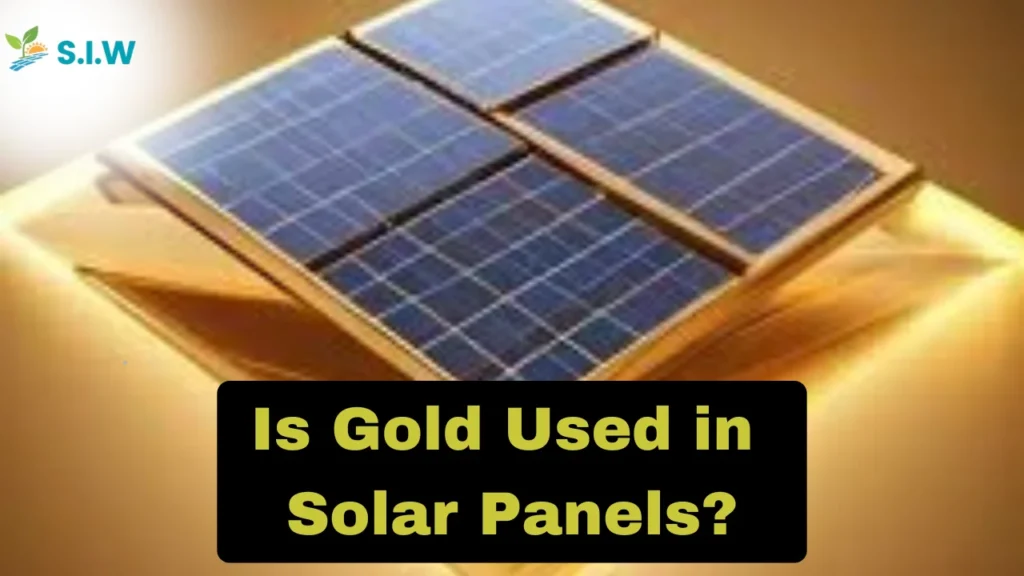Gold is often associated with wealth and luxury, but did you know it also plays a crucial role in solar panel technology? As the world shifts towards renewable energy sources, understanding the materials that make solar panels effective is essential. In this blog, we’ll explore whether gold is used in solar panels and the various benefits and drawbacks of using it.
Gold is known for its excellent conductivity and resistance to corrosion, making it an ideal candidate for various electrical applications. But how does this translate to solar panels? Let’s delve deeper into the topic to understand the role of gold in the solar industry, its advantages, and its potential downsides.
Understanding Solar Panels
Solar panels are devices that convert sunlight into electricity. They are made up of photovoltaic cells, which are typically constructed from silicon. When sunlight hits these cells, it knocks electrons loose, allowing them to flow and generate electricity. This process is known as the photovoltaic effect.
While silicon is the primary material used in most solar panels, other elements and compounds can enhance their performance. Gold, along with silver and other materials, can be used in various components of the solar panel, such as the conductive pathways.
The Role of Gold in Solar Panels
Gold is not used in the main structure of solar panels, but it can be found in some specific applications. For example, gold can be used in:
- Electrical Connections: Gold’s excellent conductivity and resistance to corrosion make it an ideal choice for electrical connections in solar panels. It can ensure long-lasting performance and reliability.
- Conductive Adhesives: In some cases, gold is used in conductive adhesives that attach solar cells to other components. This can enhance the overall efficiency of the panel.
- High-Performance Applications: For specialized solar panels, such as those used in space or high-end applications, gold may be used to improve performance and longevity.
Benefits of Using Gold in Solar Panels
- Durability: Gold is highly resistant to corrosion and tarnishing. Using gold in solar panels can improve their longevity, reducing the need for replacement and maintenance.
- Efficiency: Gold’s excellent electrical conductivity can enhance the overall efficiency of solar panels. This means more electricity can be generated from the same amount of sunlight.
- Reliability: The use of gold in electrical connections can improve the reliability of solar panels, ensuring consistent performance over time.
Drawbacks of Using Gold in Solar Panels
- Cost: Gold is an expensive material, and using it in solar panels can significantly increase their cost. This can make solar energy less accessible for many consumers.
- Availability: The supply of gold is limited, and using it in solar panels may not be sustainable in the long run. This could lead to challenges in scaling solar energy production.
- Environmental Concerns: Mining gold can have significant environmental impacts, including habitat destruction and pollution. Relying on gold for solar panels may raise questions about the overall sustainability of solar energy.
Alternatives to Gold in Solar Panels
While gold has its advantages, several alternatives can be used in solar panels, including:
- Silver: Silver is the most commonly used metal in solar panels. It offers excellent conductivity and is more affordable than gold. However, silver also faces supply limitations.
- Copper: Copper is a cost-effective alternative that offers good conductivity. It is increasingly being used in solar panel manufacturing.
- Graphene: An emerging material, graphene is lightweight and has excellent electrical properties. Researchers are exploring its potential in solar panel technology.
Personal Experience: Choosing the Right Solar Panel
When I decided to invest in solar energy for my home, I was faced with various options. I initially assumed that more expensive panels, possibly containing gold, would be the best choice. However, after thorough research, I found that many reputable solar companies, such as the Best Solar Companies in San Antonio, offer high-quality panels without gold. They utilize advanced technologies to ensure efficiency and durability, making them a cost-effective option for homeowners.
Additionally, I considered a 600 Watt Solar Panel system to meet my energy needs. It was crucial to balance performance, cost, and environmental impact in my decision-making process.
Final Thoughts
In summary, while gold is not a primary material in solar panels, it does have applications that can enhance performance, particularly in high-end or specialized systems. However, the cost and environmental concerns associated with gold make it less desirable for widespread use. Alternatives like silver and copper are more commonly used and offer a balance of performance and affordability.
As solar technology continues to evolve, researchers are exploring new materials and methods to improve efficiency and reduce costs. Understanding the role of materials like gold can help consumers make informed decisions about their solar energy investments.
FAQs
- Is gold commonly used in solar panels?
Gold is not a primary material in solar panels but can be found in specific applications like electrical connections and conductive adhesives. - What are the benefits of using gold in solar technology?
Gold offers durability, efficiency, and reliability due to its resistance to corrosion and excellent conductivity. - What are the drawbacks of using gold in solar panels?
The main drawbacks include high costs, limited availability, and environmental concerns related to gold mining. - What alternatives to gold are used in solar panels?
Common alternatives include silver and copper, both of which offer good conductivity at a lower cost. - How can I choose the right solar panel for my needs?
Consider factors like efficiency, cost, and the reputation of solar companies. Research options like the 600 Watt Solar Panel to find the best fit for your energy needs.








